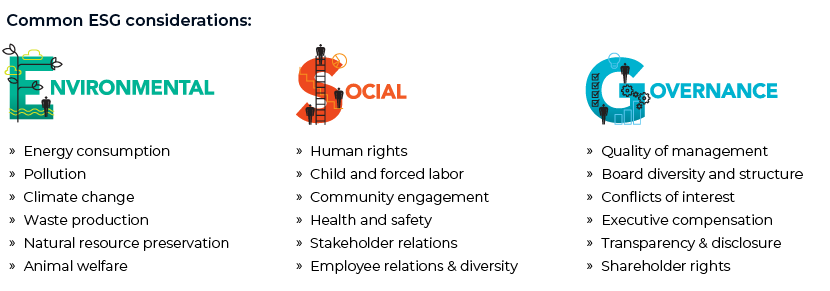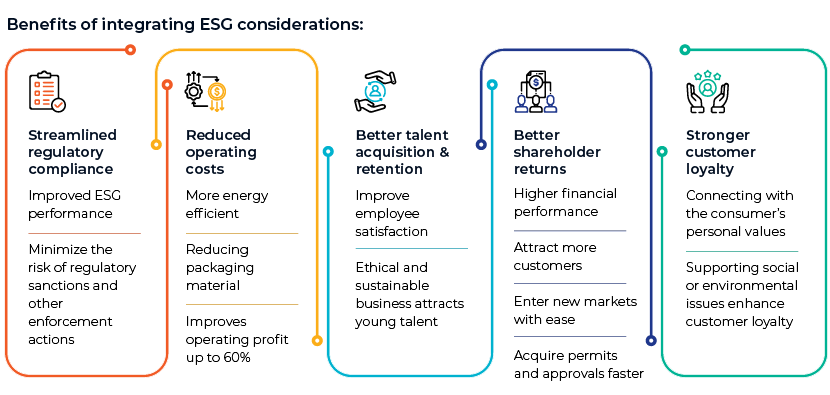Published on December 7, 2022 by Kavita Kumar and Damini Solanki
Introduction
Researchers recently confirmed a 25% increase in global warming in 2022 – the largest annual increase – and a significant rise in sea levels. This clearly indicates the inadequacy of the measures being implemented to combat climate change. Increasing adoption of environmental, social and governance practices would help ensure sustainability.
ESG criteria helps evaluate corporate behaviour and screen investment. ESG evaluation supplements traditional financial analysis by identifying a company’s risks and opportunities in terms of how it would benefit from capitalising on ESG-related opportunities and how it would lose due to not considering ESG-related risks.
ESG criteria helps investors reduce loss by investing in companies not engaged in risky or unethical practices.


Hong Kong
Current regulations
-
1. ESG integration – MPFA’s ESG guidelines
The Mandatory Provident Fund Schemes Authority (MPFA) regulates trustees who work with managers to sell pension fund products to end investors. Trustees adhere to the MPFA’s ESG investment guidelines to select more EGS-focused or sustainably managed funds.
-
2. ESG funds – SFC ESG Fund Circular & Climate Disclosure (FMCC)
Securities and Futures Commission (SFC)-authorised funds comply with the circular’s requirements and are released as verified ESG funds. They aim to prevent greenwashing and mis-selling of investment strategies. The fund managers are obliged to consider climate risk in their investment and risk management processes and make disclosures accordingly.
-
3. Corporate disclosures – HKEX ESG reporting/corp. governance code
Listed companies are required to make disclosures in annual ESG reports considering the Task Force on Climate-Related Financial Disclosures’ (TCFD’s) recommendations. The “comply or explain” approach adopted by HKEX allows companies to prepare ESG reports conforming to criteria relating to materiality and quantitative, unbiased and consistent reporting.
-
4. Climate risk stress tests – HKMA’s climate risk stress tests
Policy manual GS-1 includes a detailed scenario analysis and stress testing and for providing guidance on the Hong Kong Monetary Authority’s (HKMA’s) requirement for banks to have a risk management framework relating to climate risk.
-
5. Green and sustainable finance – Cross-Agency Steering Group
The Steering Group aims to position Hong Kong as a leader in green and sustainable finance and help the financial ecosystem transition towards carbon neutrality. Its vision is to align mandatory climate-related disclosures with the TCFD framework.
Regulations being developed/construction/voluntary
-
1. Stewardship code – SFC PRO
Hong Kong Securities and Future Commission (SFC) in March 2016 issued Principles of Responsible Ownership to retain investor engagement initiatives and encourage the investment culture to strengthen corporate governance.
-
2.Taxonomy – Common Ground Taxonomy (CGT)Implementing CGT could be a ground-breaking step towards a low-carbon economy by attracting investment, as CGT focuses on lowering transaction costs and smoother flow of cross-border green capital by avoiding duplicating the verification process, increasing market confidence and reducing market segmentation.
Singapore
-
1.Green Plan 2030
This high-level principle signature plan for ESG was originally built on Singapore’s commitments under the UN’s plan to reach net zero emissions by 2030.
In 2019, the basic principles of the plan were addressed in broad terms by Singapore’s Minister of Education Ong Ye Kung in his speech on setting goals for Singapore’s sustainability policies. Financial innovation and fintech and other technologies play a major role in Singapore’s ESG solutions.
-
2. Environmental risk management guidelines
The Monetary Authority of Singapore (MAS) issued environmental risk management (ERM) guidelines for banks, asset managers and insurers in 2020. These guidelines aim to strengthen the financial sector’s role in supporting Singapore’s transition to an environmentally sustainable economy and financial institutions’ (FIs’) response to environmental risk.
The guidelines include the following:
-
a). Governance and strategy: The board and senior management should take environmental considerations into account with regard to FIs’ risk appetite and overall strategy and business plans and oversee their environmental risk management.
-
b). Management and monitoring of environmental risk exposures: FI’s should develop stress testing capabilities and conduct scenario analysis to assess flexibility of financial losses. Generally, FIs are expected to support higher-risk customers’ transactions to ensure sustainable business practices, for example, sector collaboration or use of financing conditions in loan agreements.
-
c). Training: FIs should train staff to manage and monitor environmental risk.
-
d). Disclosures: FIs should disclose their approach to environmental risk management in terms of international reporting frameworks (e.g., the TCFD’s “gold standard” recommendations).
The MAS Green Finance Industry Taskforce’s (GFIT’s) handbook explains how environmental risk management should be conducted, provides examples of ESG declaration, and outlines best practices. It has also compiled a Financial Institutions Climate Related Disclosure Document (FCDD) that provides details on disclosure aligned with the TCFD’s recommendations.
-
3. Sustainable loans and bonds:
Singapore has been an innovator in the green and sustainable loan space. There is no specific amendment in place, but the ERM guidelines provide broad principles for ensuring sustainable lending. The GFIT also provides training on FI compliance with these principles. The Loan Market Association (LMA), the Asia-Pacific Loan Market Association (APLMA) and the Loan Syndications and Trading Association (LSTA) also provide green loan principles and sustainability-linked loan principles.
Despite these multiple principles, guidelines and training mechanisms, Singapore does not have specific legislation governing green bonds or sustainable loans. However, there are companies deemed to be ESG-compliant by leading global research and analytics firms listed on its stock exchange. Moreover, Singapore is leads issuance of green bonds, sustainable bonds and sustainability-linked bonds in ASEAN; these are also listed on its stock exchange.
The recently published ERM handbook should ensure increased ESG standardisation in ASEAN.
How Acuity Knowledge Partners can help
Acuity Knowledge Partners offers a suite of services in marketing and investment communication. We support prominent investment managers in ESG-specific RFPs/DDQs and marketing collaterals, as well as assist in ESG e-mail campaigns and investment commentaries. To help organizations communicate their ESG themes better, we leverage our fund management specialists’ rich and extensive experience, built over the years through collaboration with leading investment management firms.
References:
-
ESG, SRI, and Impact Investing: What's the Difference? (investopedia.com)
-
ESG | The Report What is ESG and Why is it Important? (esgthereport.com)
What's your view?
About the Authors
Kavita has over 2 years of experience in investment compliance at Acuity Knowledge Partners. Currently working in post trade monitoring. She has done her Masters in Ramaiah College, Bangalore.
Damini Solanki has rich experience into Investment Compliance. She has previously worked with AXA Business Services. Her expertise span across compliance and risk sector, which includes compliance reviews of Investment guidelines and regulatory changes. At Acuity Knowledge Partners she is part of Investment compliance team and specializes in guideline coding and trade monitoring. She completed her PGDM in Financial Management from Symbiosis Institute of Business Management, Pune and BBA from Shri Vaishnav Institute of Management, Indore.
Like the way we think?
Next time we post something new, we'll send it to your inbox








